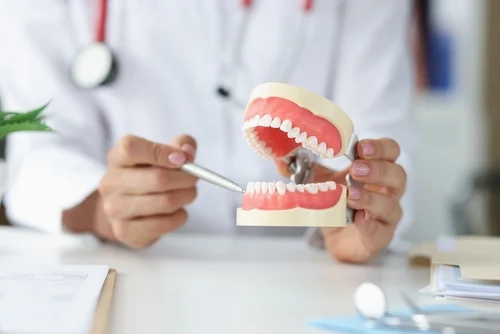Health
The Connection Between Diet and Oral Health
Published
4 months agoon

Introduction to Diet and Oral Health
Our smile is often the first thing people notice, but behind that bright smile is a network of teeth, gums, and bones that rely heavily on what we eat. Diet isn’t just about maintaining a healthy weight or avoiding chronic illnesses; it plays a massive role in shaping oral health. The mouth is the entry point of nutrition, and every food or drink we consume has a direct impact on dental well-being.
When we think of cavities, most of us immediately blame sugar, but the truth is deeper than that. Nutrition can determine how strong your enamel is, how resilient your gums are, and even how quickly your mouth recovers from dental treatments. From calcium-rich foods that build enamel to antioxidants that reduce gum inflammation, diet and oral health share a powerful, often underestimated connection.
In today’s world, where processed and sugary foods dominate many diets, oral problems like cavities, gum disease, and even tooth loss have become widespread. That’s why understanding the link between diet and oral health is more important than ever. By making simple, conscious dietary choices, we can protect our teeth naturally while complementing professional dental care.
This article explores the science and real-life impact of nutrition on oral health, highlights the best and worst foods for your teeth, and even discusses how diet plays a role in orthodontic treatments like Invisalign treatment Tustin or restorative procedures such as missing tooth replacement. By the end, you’ll see that the path to a healthy, radiant smile often begins at the dining table.
Why Nutrition Matters for a Healthy Smile
Imagine trying to build a house with weak bricks and flimsy cement—no matter how good the design, it won’t last long. The same goes for teeth and gums. Without the right nutrition, they weaken, making them vulnerable to decay, gum disease, and even tooth loss. Nutrients like calcium, vitamin D, phosphorus, and vitamin C are the building blocks of oral strength, and their absence leaves the mouth defenseless.
Calcium and phosphorus work together to strengthen tooth enamel, which acts as a shield against bacteria and acids. Vitamin D enhances calcium absorption, while vitamin C supports gum tissue and prevents inflammation. Even tiny deficiencies can show up quickly—bleeding gums, weak enamel, and increased cavities are often silent cries for better nutrition.
But nutrition doesn’t just prevent problems; it accelerates healing too. After dental procedures like fillings, extractions, or even cosmetic solutions, the body needs proper nourishment to repair tissues. Patients recovering from treatments like dental implants or missing tooth replacement often heal faster when their diet includes adequate protein, vitamins, and minerals.
In short, a poor diet may not show immediate effects, but over time, it chips away at oral health, just like water slowly erodes stone. On the flip side, a balanced diet is like an insurance policy for your smile—protecting it today while investing in long-term oral strength.
The Link Between General Health and Oral Health
You might wonder—what does your gut, heart, or bones have to do with your teeth? The answer: everything. The mouth is often called the “mirror of health” because oral issues can be early warning signs of broader health problems. Gum disease, for instance, has been linked to diabetes, heart disease, and even respiratory infections.
Diet is the common thread connecting both oral and general health. Take bone density as an example—osteoporosis can weaken the jawbone, leading to loose teeth. A diet rich in calcium and vitamin D helps prevent both osteoporosis and oral bone loss. Similarly, diets high in antioxidants not only lower inflammation throughout the body but also protect gums from periodontal disease.
What’s fascinating is how systemic health problems often manifest in the mouth first. A nutrient-deficient diet can trigger symptoms like mouth ulcers, bleeding gums, or delayed healing—clues that the body is struggling internally. This is why dentists often emphasize nutrition as part of preventive care.
Think of your body as one interconnected machine. If you put the wrong fuel into it, both the engine and the wheels suffer. Likewise, poor diet affects not just your weight or cholesterol but also the foundation of your smile. By prioritizing a nutrient-rich diet, you’re not just protecting your teeth—you’re also strengthening your entire body.
How Diet Influences Teeth and Gums
The impact of diet on oral health isn’t abstract—it’s immediate and visible. Every bite and sip changes the environment of your mouth, affecting saliva production, enamel strength, and bacterial growth. Certain foods feed harmful bacteria, while others fight them naturally. Over time, these small daily choices create either a strong smile or a fragile one.
Carbohydrates and sugars are notorious culprits. When bacteria in the mouth feast on sugar, they produce acids that erode enamel, creating the perfect setup for cavities. Sticky and refined carbs, like chips or white bread, cling to teeth longer, extending acid attacks. On the other hand, crunchy vegetables act as natural toothbrushes, scrubbing away food particles while stimulating saliva flow.
Saliva is your mouth’s unsung hero—it neutralizes acids, washes away bacteria, and delivers essential minerals to enamel. Diet directly affects saliva production; staying hydrated and consuming water-rich foods like cucumbers and watermelon help maintain this protective barrier.
Vitamins and minerals also play starring roles. Vitamin A helps maintain healthy mucous membranes in the mouth, vitamin C strengthens gums, and iron prevents sores and inflammation. Without these nutrients, the mouth becomes more vulnerable to infections and slow healing.
So, in essence, what you eat shapes the microscopic environment inside your mouth. Every meal is a choice: feed the bacteria that cause decay, or nourish the teeth and gums that give you a healthy smile.
Role of Carbohydrates, Sugars, and Acids
Carbohydrates aren’t the enemy, but the type and frequency matter a lot. Simple carbs like candies, cakes, and sodas break down quickly into sugars, fueling acid-producing bacteria. The more often you snack on them, the more frequently your teeth face acid attacks. It’s like leaving your enamel under constant rain without an umbrella.
Acidic foods and drinks—think citrus fruits, vinegar, sodas, and sports drinks—present a double threat. They erode enamel directly and make teeth more vulnerable to decay. Even “healthy” habits like sipping lemon water all day can backfire, leaving enamel thin and sensitive.
But here’s the good news: complex carbs like whole grains, fiber-rich fruits, and vegetables actually benefit oral health. They require more chewing, which stimulates saliva, and they release sugar slowly, reducing acid production. Pairing acidic foods with calcium-rich ones, like cheese or milk, can also help neutralize damage.
In practical terms, it’s not about eliminating carbs or acids entirely but being mindful of balance. Enjoy sweets or acidic foods occasionally, but don’t make them constant companions. Think of your enamel as a precious shield—every sugar binge or acidic sip chips away at it, while balanced meals help reinforce its strength.

Tips and Tricks for First-Date Men’s Fashion in 2026

Call My Doctor Health Care LLC Sets a New Standard for Home Healthcare in Dubai

StableProxy Review: What Is It and Why You Might Need It in 2026

Recording Apps: Best Picks for Audio Capture in Screen Recording (2026 Guide)

7 Curb Appeal Improvements Your Home Might Be Crying Out For

Why Ahmedabad is a Must Visit City in India?

Trend vs Investment: Which Watch Features Stay Stylish for Years (Crystal, Case, Dial, Bracelet)

Corporate Reputation Management and the Cost of AI-Generated Errors

Hidden Costs of Economy Umrah Packages: A Breakdown of Extra Fees

RF PCB Solutions: How FastTurn PCB Powers High-Frequency Electronics with Precision

Who Is Marlene Knaus? The Untold Story of Niki Lauda’s First Wife

Jacqueline Bernice Mitchell: The Inspiring Story of Jerry Rice’s Ex-Wife

Curious About JOI Database? Read This First Before You Click Anything

Mickey Middleton: The Untold Story of Bryan Cranston’s First Wife

Where Is Barbara Boothe Now? Inside Her Life After Larry Ellison

Wendy Lang: Meet the Therapist Married to Cenk Uygur

Alisande Ullman Today: What Happened After Her Divorce from Leslie Nielsen?

Where Is Noelle Watters Now? Jesse Watters’ Ex-Wife’s Life After Divorce

Where Is Tanya Hijazi Now?: All About Rick James’ Former Wife

Should You Use Wooflix in 2025? Honest Review and Best Alternatives

Tips and Tricks for First-Date Men’s Fashion in 2026

Call My Doctor Health Care LLC Sets a New Standard for Home Healthcare in Dubai

StableProxy Review: What Is It and Why You Might Need It in 2026

Recording Apps: Best Picks for Audio Capture in Screen Recording (2026 Guide)

7 Curb Appeal Improvements Your Home Might Be Crying Out For

Why Ahmedabad is a Must Visit City in India?

Trend vs Investment: Which Watch Features Stay Stylish for Years (Crystal, Case, Dial, Bracelet)

Corporate Reputation Management and the Cost of AI-Generated Errors

Hidden Costs of Economy Umrah Packages: A Breakdown of Extra Fees

RF PCB Solutions: How FastTurn PCB Powers High-Frequency Electronics with Precision
Categories
Trending
-

 Celebrity8 months ago
Celebrity8 months agoWho Is Marlene Knaus? The Untold Story of Niki Lauda’s First Wife
-

 Celebrity5 months ago
Celebrity5 months agoJacqueline Bernice Mitchell: The Inspiring Story of Jerry Rice’s Ex-Wife
-

 Entertainment6 months ago
Entertainment6 months agoCurious About JOI Database? Read This First Before You Click Anything
-

 Celebrity6 months ago
Celebrity6 months agoMickey Middleton: The Untold Story of Bryan Cranston’s First Wife
